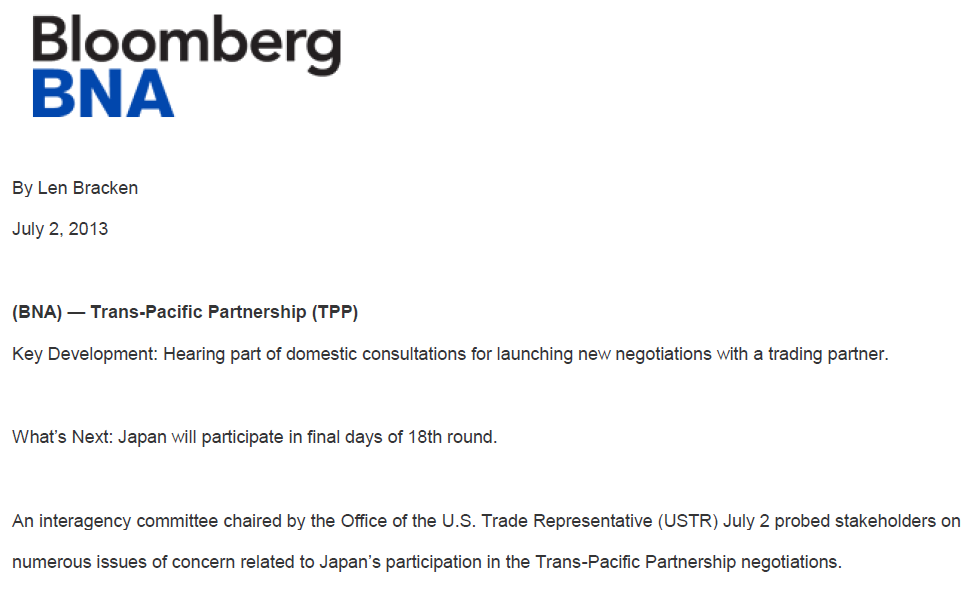Reproduced with permission from Daily Report for Executives, 128 DER A-38 (July 3, 2013).
Copyright 2013 by The Bureau of National Affairs, Inc. (800-372-1033) <http://www.bna.com>
By Len Bracken
July 2, 2013
(BNA) — Trans-Pacific Partnership (TPP)
Key Development: Hearing part of domestic consultations for launching new negotiations with a trading partner.
What’s Next: Japan will participate in final days of 18th round.
An interagency committee chaired by the Office of the U.S. Trade Representative (USTR) July 2 probed stakeholders on numerous issues of concern related to Japan’s participation in the Trans-Pacific Partnership negotiations.
The stakeholders, who included supporters and skeptics of Japan’s participation in the talks, provided input on U.S. negotiating objectives in the TPP talks and U.S.-Japan parallel negotiations to address automotive and other nontariff measure issues.
After brief testimony, the stakeholders responded to questions from Trade Policy Staff Committee members from the departments of Agriculture, Commerce, Labor, State, and Treasury, as well as USTR.
Members of the committee raised issues related to Japan’s economic reforms, its mergers and acquisitions policy for foreign investors, electronic commerce, regulatory coherence, government procurement, and use of investor-state dispute settlement tribunals by Japanese investors.
The hearing is part of the domestic consultations that would take place during the 90-day congressional notification period required under trade promotion authority (TPA). Although TPA lapsed in 2007, USTR has said it is abiding by the requirements of the law.
Japan will only be able to participate in the last three days of the upcoming 18th round set for July 15-24 in Malaysia because the beginning of the round overlaps with the end of the 90-day notification period.
Cutler Notes Conflicting Testimony on Autos
Wendy Cutler, acting deputy U.S. Trade Representative, noted in her questioning that one of the stakeholders wanted the slowest phase-in for auto parts and another wanted the quickest.
Five of the 16 stakeholders discussed issues related to the automobile industry, primarily the problem of nontariff barriers and market penetration by foreign companies.
Thea Lee, deputy chief of staff with the AFL-CIO, was skeptical that the agreement reached with Japan in April would lead to solutions for long-standing problems (30 ITR 575, 4/18/13). She noted that the deal did not include currency manipulation, auto parts, and labor rights. Lee called for the longest phase-in for tariff elimination on auto parts.
Paul Ryan, director of government affairs with the Association of Global Automakers, told the committee that his group is seeking immediate elimination of tariffs on auto parts. His association is also urging that monetary and currency policy matters not be included in TPP.
Matthew Blunt, president of the American Automotive Policy Council, said TPP must include strong and enforceable commitments against currency manipulation. He also said that the Japanese auto market is the most closed among Organization for Economic Cooperation and Development countries.
Ronald Bookbinder, general director of the Washington office of the Japan Automobile Manufacturers Association, said that Japan’s auto market is fully open, noting the absence of tariffs on auto imports. He attributed the lack of market penetration by foreign manufacturers to consumer preferences.
Lake Sees Japan as Unique Partner
In response to a question from Andrew Quinn, deputy assistant U.S. Trade Representative, on the strength of the partnership between the two countries, the chairman of the U.S.-Japan Business Council, Charles Lake, said that Japan has come a long way since the days of heightened trade friction with the United States seen two or three decades ago.
He noted that Japanese officials and businesses are well aware of what is being sought in the TPP talks with regard to a 21st century, high-standard agreement. The intellectual property rights and supply chain concerns of U.S. companies are the same as those faced by Japanese companies.
“That’s the reason why now, we can be partners in a unique way, given the U.S.-Japan relationship and how we worked through those problems, in developing new solutions in a regional context,” Lake said.
He noted that the Japanese are experts on issues related to strong industrial policies and nontariff barriers that are now used by developing countries in the TPP talks so they have the knowledge to address those issues.
The current group of 11 TPP members comprise Australia, Brunei Darussalam, Canada, Chile, Malaysia, Mexico, New Zealand, Peru, Singapore, the United States, and Vietnam.
Click to view PDF


